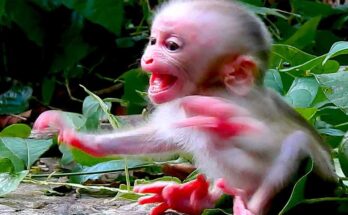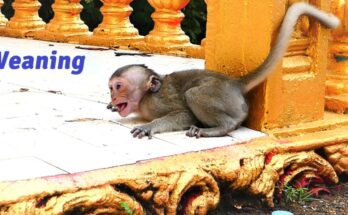Badly Mom Libby Full Angry, Baby Leo Yelling for Milk Getting and She’s Strong Abusing
In the quiet shadows of the dense jungle, among the hanging vines and rustling trees, a sad story was unfolding. A tiny wild baby monkey named Leo, barely a few weeks old, was struggling to survive—not because of predators or harsh weather, but because of his own mother.
Libby, a seasoned female in the troop, once known for her strength and leadership, had recently given birth to Leo. But unlike most mothers in the troop who cuddled and protected their newborns, Libby’s behavior toward Leo was harsh and unpredictable. Her eyes often glared at him with frustration, and her body language stayed tense, especially when Leo cried.
Leo, like any infant, cried often—especially when he was hungry. His soft wails echoed through the trees, tiny and helpless. He clung to his mother’s belly, hoping for comfort, for milk, for warmth. But each time he tried to nurse, Libby would respond with anger.
She pushed him away, sometimes with such force that he nearly tumbled from her side. Her hands, large compared to his fragile body, would grip him roughly, shaking him off when he tried to latch onto her nipple. The other monkeys noticed but kept their distance. Troop hierarchy was strict, and Libby was not a mother to be challenged.
Each morning, while the troop foraged for fruits and leaves, Libby moved quickly through the trees, never slowing down for little Leo. The baby had to cling tightly to her fur just to stay attached. His stomach growled from hunger, but every attempt to feed ended in abuse—sharp pulls, loud grunts, or even a hard swat.
As the jungle sun rose high, Leo’s cries became more desperate. He wailed for milk, his tiny face soaked with sweat and tears. Libby snarled at him, baring her teeth, as if his cries were a threat. She didn’t offer comfort. Instead, she turned her back and walked away, leaving him for several minutes alone on a branch before reluctantly returning.
There were rare moments when Leo managed to get a few drops of milk—but always followed by more rejection. His body was thinner than other babies his age. His fur looked ruffled, his movements slow. The troop’s older females sometimes glanced at him with sympathy, but none intervened.
Despite the abuse, Leo clung to life. He tried to mimic the older babies by chewing on soft fruits and drinking water from leaves. His strength was small, but his will to survive was strong. Every scream, every attempt to nurse, was a cry not just for food—but for love.
The jungle is often beautiful, but it can also be brutal. For little Leo, each day was a fight not only against hunger, but against a mother who had lost her softness. And under the green canopy, where other babies thrived in the safety of nurturing arms, Leo’s cries were a haunting reminder that not every bond is born in love.


